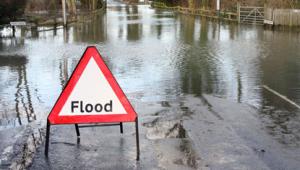11 April 2008
Last summer's floods were caused less by rivers bursting their banks and more by our inadequate drainage systems. The current system of myriad responsibilities and little liaison needs urgent reform
There were a lot of lessons to be learnt from last summer's floods. So many, in fact, that Sir Michael Pitt's interim report has already produced 15 recommendations and a further 92 interim conclusions.
His final report, to be published this summer, will presumably include even more suggestions as to how we could be better prepared to deal with the consequences of such extreme weather in the future.
It is entirely right that a comprehensive, root-and-branch review is taking place. But the people affected by the events of last summer will be saddened that it took such devastation to start asking serious questions about our preparedness.
More extreme weather is an unavoidable consequence of climate change. How we combat global warming and reduce our carbon emissions is one of the most critical issues facing us all. But in terms of how we deal with the consequences of this, there is a glaring need just to get the basics right.
The 2007 floods were not caused so much by rivers bursting their banks or apocalyptic storms battering our coastline. They were mainly a result of surface water flooding — of our drains being unable to cope with the sheer volume of rain. In short, much of the devastation was caused by a lack of common sense in managing our infrastructure.
People increasingly understand the threat that is posed by climate change. What they will not tolerate is decision-makers shirking the choices that need to be made now to help us prepare for more extreme weather.
The 'system' that is currently in place for maintaining our drains would be laughable if it did not have such potentially serious consequences. There are up to nine different bodies with some kind of responsibility for surface water drainage, and this cannot continue.
At the moment, a water company, for example, can make significant changes to drains it is responsible for and not tell anybody what it has done. This happens frequently, with councils — responsible for emergency planning — kept in the dark about the state of the local water infrastructure.
Picture this: on an average English high street, myriad different organisations will have responsibility for maintaining different parts of the drainage system. It could be the local council. Or it could be the Environment Agency, a water company, a private landowner or even a householder.
At present there is no duty on anyone to keep a comprehensive plan of who owns what or is responsible for what. Which means in some parts of the country nobody knows. It is madness.
Pitt's interim report went some way to recognising this. It recommended that local authorities should lead on the management of surface water flooding and drainage 'with the support of all responsible organisations' — including the water companies and the Highways Agency.
In principle, the Local Government Association supports this conclusion. However, we feel other organisations need to have a far stronger obligation placed upon them than to 'support' councils in taking on this role.
If we are to start making the improvements that are needed to our drainage systems, we must have a new statutory framework that places a clear duty on the part of all organisations to co-operate. There must be no ambivalence — nothing to suggest that participation is some kind of voluntary activity. And there must be penalties for those who refuse to play ball.
In each local area, we need to establish where the problems are and work together to resolve them, to develop coherent strategies and ensure our plans are communicated to the public. All of this is basic stuff, but too little of it has actually been happening.
It goes without saying that more investment will also be needed. Again, it is surely common sense to realise that spending money to improve our flood defences and infrastructure now will potentially save more in the future.
Local government recognises that it needs to up its game as well. The LGA launched a major new climate change campaign last month — 'Small Change, Big Difference' — and one of its core objectives is for councils to recognise how global warming will affect infrastructure planning.
In setting up the Pitt Review, the government has indicated a willingness to learn lessons from the 2007 floods. What we now need is for something to happen. The problems are clear: multiple ownership of the drainage system, unclear responsibilities and lack of investment. The sooner action is taken to address these issues, the better prepared we will be for events like last summer.
Paul Bettison is chair of the Local Government Association's environment board. The LGA response to Sir Michael Pitt's interim report is being published this week
PFapr2008



















